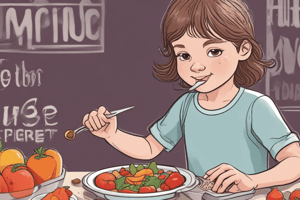Podcast
Questions and Answers
What are some of the main health effects of consuming junk food on children?
What are some of the main health effects of consuming junk food on children?
Junk food consumption can lead to obesity, nutritional deficiencies, and increased risk of chronic diseases in children.
How can caffeine negatively impact children's health?
How can caffeine negatively impact children's health?
Caffeine can disrupt sleep patterns, increase anxiety, and affect concentration in children.
What nutritional guidelines should be followed for children's diets?
What nutritional guidelines should be followed for children's diets?
Children should consume a balanced diet rich in fruits, vegetables, whole grains, protein, and healthy fats while minimizing junk food.
What are some healthy alternatives to common junk food items?
What are some healthy alternatives to common junk food items?
What is the impact of sugar-sweetened beverages on children's health?
What is the impact of sugar-sweetened beverages on children's health?
Why should children and adolescents avoid excessive consumption of junk foods?
Why should children and adolescents avoid excessive consumption of junk foods?
What role do processed foods play in a child's diet?
What role do processed foods play in a child's diet?
How often can children consume junk food according to current guidelines?
How often can children consume junk food according to current guidelines?
What are some potential short-term effects of junk food consumption on children?
What are some potential short-term effects of junk food consumption on children?
What nutritional guidelines should parents follow regarding children's diet?
What nutritional guidelines should parents follow regarding children's diet?
What are healthy alternatives to junk food for children?
What are healthy alternatives to junk food for children?
What role do sugar-sweetened beverages play in childhood obesity?
What role do sugar-sweetened beverages play in childhood obesity?
In what ways do ready-to-eat foods differ from healthier meal options?
In what ways do ready-to-eat foods differ from healthier meal options?
How can parental dependency on convenience foods affect children's eating habits?
How can parental dependency on convenience foods affect children's eating habits?
What is a safe limit for carbonated drinks in a child's weekly diet?
What is a safe limit for carbonated drinks in a child's weekly diet?
What are the potential health risks associated with high sugar intake from junk food in children?
What are the potential health risks associated with high sugar intake from junk food in children?
How does caffeine consumption affect children's health?
How does caffeine consumption affect children's health?
What nutritional guidelines should be followed for babies up to 6 months old?
What nutritional guidelines should be followed for babies up to 6 months old?
What are some healthy food alternatives to junk food for children?
What are some healthy food alternatives to junk food for children?
What is the link between sugar-sweetened beverages and childhood health?
What is the link between sugar-sweetened beverages and childhood health?
How do food additives in ultra-processed foods affect children's health?
How do food additives in ultra-processed foods affect children's health?
What are the consequences of microbial contamination from poor hygiene in food preparation?
What are the consequences of microbial contamination from poor hygiene in food preparation?
Why is it crucial to avoid giving honey, juices, or tea to infants under 6 months?
Why is it crucial to avoid giving honey, juices, or tea to infants under 6 months?
Flashcards
Junk Food Definition
Junk Food Definition
Foods high in unhealthy ingredients like sugar, unhealthy fats, and sodium, often processed or packaged.
Examples of Junk Food
Examples of Junk Food
Processed breakfast cereals, ready breads, instant noodles, commercial ice creams, and packaged snacks, restaurant meals like pizza, and certain drinks.
Harmful Effects of Junk Food
Harmful Effects of Junk Food
Can lead to various health problems, some appearing quickly, and others later, due to high sugar, unhealthy fats, and processed ingredients.
Portion Control of Junk Food
Portion Control of Junk Food
Signup and view all the flashcards
Work-Parents and Junk Food
Work-Parents and Junk Food
Signup and view all the flashcards
Healthy Eating Importance
Healthy Eating Importance
Signup and view all the flashcards
Food Processing and Health
Food Processing and Health
Signup and view all the flashcards
Low Fat Food Example
Low Fat Food Example
Signup and view all the flashcards
Junk Food Examples
Junk Food Examples
Signup and view all the flashcards
Frequent Junk Food Consumption
Frequent Junk Food Consumption
Signup and view all the flashcards
Healthy Eating
Healthy Eating
Signup and view all the flashcards
Ultra-Processed Foods
Ultra-Processed Foods
Signup and view all the flashcards
Nutritionally Inappropriate Foods
Nutritionally Inappropriate Foods
Signup and view all the flashcards
Dietary Fats
Dietary Fats
Signup and view all the flashcards
Sugar-Sweetened Beverages
Sugar-Sweetened Beverages
Signup and view all the flashcards
Simple carbohydrates
Simple carbohydrates
Signup and view all the flashcards
Processed foods
Processed foods
Signup and view all the flashcards
Microbial contamination
Microbial contamination
Signup and view all the flashcards
High sugar content
High sugar content
Signup and view all the flashcards
Food additives
Food additives
Signup and view all the flashcards
Caffeinated drinks
Caffeinated drinks
Signup and view all the flashcards
Exclusive breastfeeding (babies)
Exclusive breastfeeding (babies)
Signup and view all the flashcards
Homemade food options (babies)
Homemade food options (babies)
Signup and view all the flashcards
Study Notes
Guidelines for Parents: Healthy Eating and Junk Food
-
Junk Food Definition: Foods high in dietary fats, sugar, salt, or nutritionally inappropriate. Many ultra-processed foods fit this description.
-
Junk Food Frequency: Limit to one serving per week, not exceeding 50% of a child's daily calorie needs.
-
Healthy Food Options for Babies, Toddlers, and Young Children:
-
Infants (6 months to 1 year): Khichdi, Dalia, Sooji Kheer, Mashed Potatoes/Banana/Boiled Vegetables, Upma, etc.
-
Toddlers and Children: Dal, Rice, Chapati, Vegetables, Curd, Chilla, Egg, Fruits, Idli/Dosa (home-made), Upma/Seviyan/Poha, Milk Fruit Smoothies, Cooked Beans, Roasted/Boiled Chicken/Fish.
-
Energy Intake Distribution:
-
Fats: 15-30%
-
Proteins: 10-15%
-
Carbohydrates: 55-75%
-
Free Sugars: <5%
-
Trans Fat: Avoid
-
Recommended Salt Intake: <1g (0-12 months); <2g (1-3 years); <3g (4-6 years); <5g (7-10 years); <6g (≥11 years) per day.
-
Juices and Shakes: Avoid pre-packaged options. Whole fruit is better. Limit fresh juice to 125 mL/day (2-5 years old) and 250 mL/day (5+ years).
-
Milk Supplements: Be cautious; they are ultra-processed foods; they aren't as good as other food sources for vitamins and minerals.
-
Home-cooked Delicatessen: Many foods, while made at home, can contribute to a "junk food" diet. High fat/sugar/salt content and low nutritional value still apply.
-
Cooking Oil Choices: Use oils commonly used for family meals. Avoid reusing oils repeatedly. Use oils like groundnut or mustard oil and occasionally, soyabean and olive oil. Low levels of desi ghee or butter can be added for taste.
-
Food Refusal (Children): Introduce one new food at a time. Role model healthy eating; keep healthy food available; avoid junk food at home. Avoid forced feeding.
-
Tea and Coffee (Teenagers): Limit to one cup (200 mL) per day for 10-18 year olds. Avoid energy drinks.
Studying That Suits You
Use AI to generate personalized quizzes and flashcards to suit your learning preferences.




